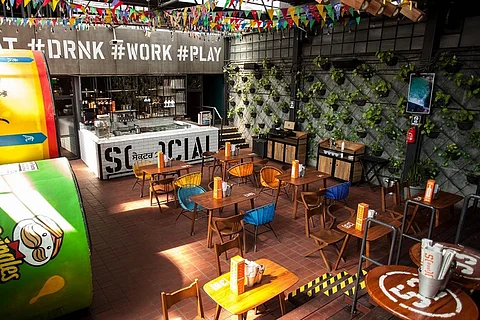

Tropical, Bollywood in all its glory, 1970s design influences, a forest amidst concrete, and paying homage to a historical monument — these are all themes of Social restaurants across India, a brand that’s now ubiquitous in the country.
Social first opened in the heart of Bengaluru — on Church Street, six years ago. Founded by CEO and Managing Director of Impresario Handmade Restaurants Riyaaz Amlani, it wasn’t just a cafe and co-working space, but also a city hotspot that came alive at night with its bar. Since then, the brand has grown quickly, with over 28 such restaurants across the country — including a new location in Indiranagar. Every Social has its own quirks, and a few trademark characteristics — distinct decor, food adapted to the location, the menu rolled up like a tabloid, and glasses branded with millennial-friendly catch phrases like #paani and #thandibeer.
Social isn’t the only restaurant based on the cafe model — most restaurants under the Impresario label (such as Smoke House Deli, Prithvi Cafe and Saltwater Cafe) are all centered around a similar idea.
“A cafe is more about the people in them and the community it serves rather than just food and drink. A cafe is accessible, approachable. You can go to a cafe twice a week, maybe even every day. You can't do the same with restaurants. The frequency of customer visits are higher. And, you're able to turn your tables around a lot more. And it's a space that we really enjoy and understand as well,” he says.
Riyaaz takes the feeling of community into his design sensibilities as well. This theme, Riyaaz says, is often taken from the property where they set up the restaurant. Hauz Khas Social in Delhi borrows elements from both the Hauz Khas Fort one can see, as well as the creative space that Hauz Khas Village has morphed into, which is where it is situated. Similarly, Koramangala Social addresses one of Bengaluru’s biggest gripes, the loss of greenery. With greenhouse-style glass ceilings, nature creeps into and all over the urban space. In a similar vein, their latest venue, Indiranagar in Bengaluru, is located in a bungalow built in the 1970s, and features design elements from that period.
Social has been committed to the idea of a co-working space and cafe+bar, and they have also been the first offices of few of India’s prominent startups. But they are also cracking some of India’s most affluent neighbourhoods.
The opening of Indiranagar Social comes after the brand opened Mount Road Social in Chennai, a city known for how hard it is to open a bar (for instance, Hard Rock Cafe in Chennai was the first one of the chain to not have a liquor licence, and had to eventually close down).
“I think Bengaluru is already pulsating, and I think Hyderabad is hot on its heels. I think Chennai is just beginning to see its own renaissance. Chennai is going to become as pulsating a city as Bengaluru and Hyderabad in no time,” Riyaaz says.
This is now part of Social’s expansion into the south, and it is on track with Impresario’s plan to open 18 outlets in FY20 across its brands with an investment of Rs 60 crore, and was on its path to raise $50 million from LCatterton Asia and open 150 Social outlets by 2024.
But the degree of growth Social aspires for is not without challenges. For example, Chennai being a hard city to break into as a bar setup. “People allude to that a lot [not getting a bar licence], but I think things have changed now. I think Chennai, you've seen a lot more bars open up. In fact, the day we opened up, two other bars opened up on the same day. Supply also creates demand. When you don't have enough places to go, you tend to go out less often. But when you have a lot more places to go out, you go out more often,” he says.
The biggest challenge, however, could be the location where Social has now opened up its latest restaurant — Indiranagar, where long-standing establishments were shut down following a crackdown.
While admitting that the restaurant industry is overly regulated, he notes, “Personally, when I come to Indiranagar, I see the stamp of Bengaluru. It's such a great representation of how pulsating and vibrant a city Bengaluru is. When you have out of town visitors, you will take them to Indiranagar to just show them how vibrant Bengaluru can be,” he adds.
This crackdown also comes at a time that Bengaluru is toying with the idea of being a 24x7 city on the heels of Mumbai. For this, Riyaaz says, there's enough evidence that goes to show that cities actually become safer the longer they are open as there’s an entire system that stays active.
“Especially in a city like Bengaluru where a lot of people work the graveyard shift, why should they be deprived of their leisure? What is it about an activity that is OK in the day but becomes illegal at night? So either we accept that we're in a state of partial curfew or we understand that if this makes sense in the day, it should make sense at all times,” he adds.
However, at a time that there are opportunities for growth, customers’ wallets are shrinking amid an economic slowdown. Lesser disposable income or apprehension to spend on eating out can only make things rougher in an already ruthless hospitality industry.
“When the economy slows down, it is going to have an effect and I don't think anybody's going to be spared. To what degree, depends on the competence of the restaurant. Things are tough, and are getting tougher. But, I think one of the things that you have to say about restaurateurs is the hardy resilient bunch. I think they'll survive this too,” he says.